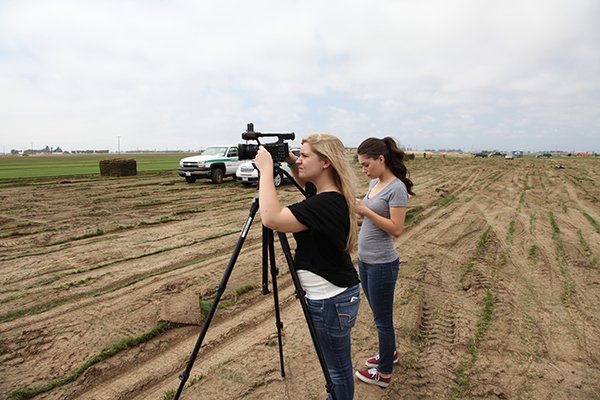A dry spell to remember
Ramifications of and local responses to California's worst drought in a millennium are the subject of a documentary by two students and a professor.

Seniors Kristiann Jones (left) and Karie Portillo Guerra became friends over a summer spent shooting their documentary on the California drought with faculty member David Grannis.
The worst California drought in about 1,200 years, according to tree ring evidence, appeared all but over by March of this year, but its lessons and its stories have just begun to be learned and told. Two student filmmakers and assistant professor of communication David Grannis devoted much of the summer to it, traveling to Cal State Fresno’s orchards and livestock farms, the pumped-dry town of Stratford and an idled sod farm in Oxnard to do more than 20 interviews.
The team of three is showing portions of the documentary at the Smart and Sustainable College Campuses conference in College Park, Maryland, at the end of March. One segment of the film looks at water-saving measures undertaken in the last three years at Cal Lutheran.
The subject of water in California leads everywhere, like a leak from upstairs. In Stratford, the effects of drought were direct and straightforward. With groundwater essentially used up, the earth there was sinking.
“I can’t tell you how heartbreaking it was,” said senior Karie Portillo Guerra of Ventura, a double-major in communication and marketing communication who set up interviews and kept records of shoots in the logging book. “While we were there, we saw people moving out, loading up trailers with their things, because they didn’t have any water and there’s nothing for them there anymore. And these are people who grew up there, whose families had farms there.”
Meanwhile, when Thousand Oaks and other cities exceeded state-imposed targets for water savings, the impact could also be measured in nearby job losses. The documentary shows not only hopeful footage of people replacing their lawns but also an interview with a sod farm manager who had to lay off workers he’d known for 20 years because homeowners weren’t buying grass plugs.
One astonishing consequence of drought, the team learned, is a black market for nuts. Sophisticated criminals have stolen 30,000-pound loads of almonds from auctions, using forged papers of fictitious trucking companies. Because almonds are a very thirsty crop, pound for pound of produce, this amounted to the theft of millions of dollars of California water.
In making a feature-length documentary, senior communication major Kristiann Jones of Seattle learned from mistakes made behind the camera. She overexposed a couple of interviews and had some issues with audio, but now her production skills have improved sharply. Before the summer, she had done nearly all of her work in the editing booth.